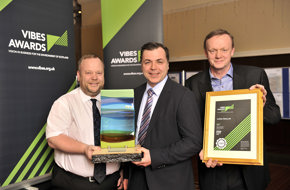Highlights
- Run the first hybrid double-decker fleet in Scotland—the highest specification fleet ever built by the manufacturer.
- Fifteen diesel–electric hybrid buses provide fuel savings of 55% in miles/gallon (~£250,000 a year).
- As a result of the use of the hybrid buses some 150,000 car journeys are being saved annually.
- Installation of ‘SCRT’ exhausts in 44 older buses has reduced NOx emissions by 70%, particulates by 95%, and hydrocarbons and carbon monoxide by 99% without using more fuel.
- Work with Envirowise to recycle 90–95% of waste.

As the winner of UK City Bus Operator of the Year 2011 and many other top industry awards, Lothian Buses provides an exemplary transport system to Edinburgh and the Lothians. Heavy investment in a new fleet and quality maintenance has provided fully accessible public transport, with ~113 million passenger journeys per year. Lothian Buses employs 2100 people, 780 of whom work at the central depot, which is 1 of 3 operational depots owned by the company. It has an allocation of 222 buses, including Scotland’s first diesel–electric hybrid double-decker fleet, 50% of Lothian Buses’ pioneering batch of ultra-low emission selective catalytic reduction trap (SCRT) exhaust-fitted buses and the Air link fleet.
The judges were impressed by their visit to the central depot site. Lothian Buses’ commitment to environmental improvements is taken very seriously and pro-actively. Direct improvements to the fleet at the central depot include fitting 44 older buses with advanced SCRT exhausts to improve air pollutant emissions, costing £660,000 and entering Scotland’s first 15 diesel–electric hybrid buses on a dedicated route (costing £5 million).
SCRT-fitted buses reduce air pollutants by 70% (NOx), 95% (particulates) and 99% (hydrocarbons and carbon monoxide) without using more fuel. SCRT fitment, which costs only a tenth of the cost of buying a new bus, through the reduction in air pollution, should also improve public health. Using figures from the European Union ‘Starbus Project’, the estimated fiscal saving through improvements to human health purely from the company’s SCRT fitments is €216,410. After trialling SCRT the company successfully lobbied the Scottish Government to make match-funding available in all Scottish cities and SCRTs are now being tested extensively in London.
The hybrid buses were promoted heavily both before and after their introduction. As a result, strong positive growth has been seen on the bus routes they follow. In real terms, some 150,000 car journeys are being saved annually as a result of these buses. The fuel saving for the company is ~£250,000 annually. The drivers of these buses have been made aware of the environmental benefits of these buses and have been trained in driving efficiently to ensure they deliver low emissions and save fuel. The judges thought the work carried out by Lothian Buses is commendable and shows a commitment to reducing environmental impact.
Since the environmental manager was put in place in 2010, Lothian Buses has worked with Envirowise to recycle 90–95% of waste.
Lothian Buses carries out an annual passenger survey, which has indicated that 30–40% of people who never use the bus would do so if environmentally-friendly vehicles were introduced on their local route—a figure confirmed by Department for Transport figures. Hybrid and SCRT buses fulfil this need, and bus drivers also benefit from a host of technological improvements on the hybrid buses.
The company has an active community programme, which includes:
- teaching children with autism how to use public transport;
- engaging with more than 1000 school children to given them employability skills and supporting the National Curriculum for Excellence;
- hosting an annual depot day, which attracts 1500–2500 visitors;
- annual ‘Santa’s grotto’ bus tours around disadvantaged communities, handing out gifts and giving children the chance to meet Santa.
Lothian Buses has also researched relevant environmental improvements. These include the use of student placements that report to the environmental manager, which have been sourced via the Green Business Partnership. The business has provided information on its environmental performance through its website, public open-door days, bus stop adverts and community/school involvement. These are useful tools to keep the public informed of their environmental progression.
The work carried out by Lothian Buses has significantly reduced its environmental impact in terms of saving fuel, emissions and waste. Dr Steve Johnson, the environmental manager, is also to be commended for his work. The judges were highly impressed by Lothian Buses and its continual improvement.